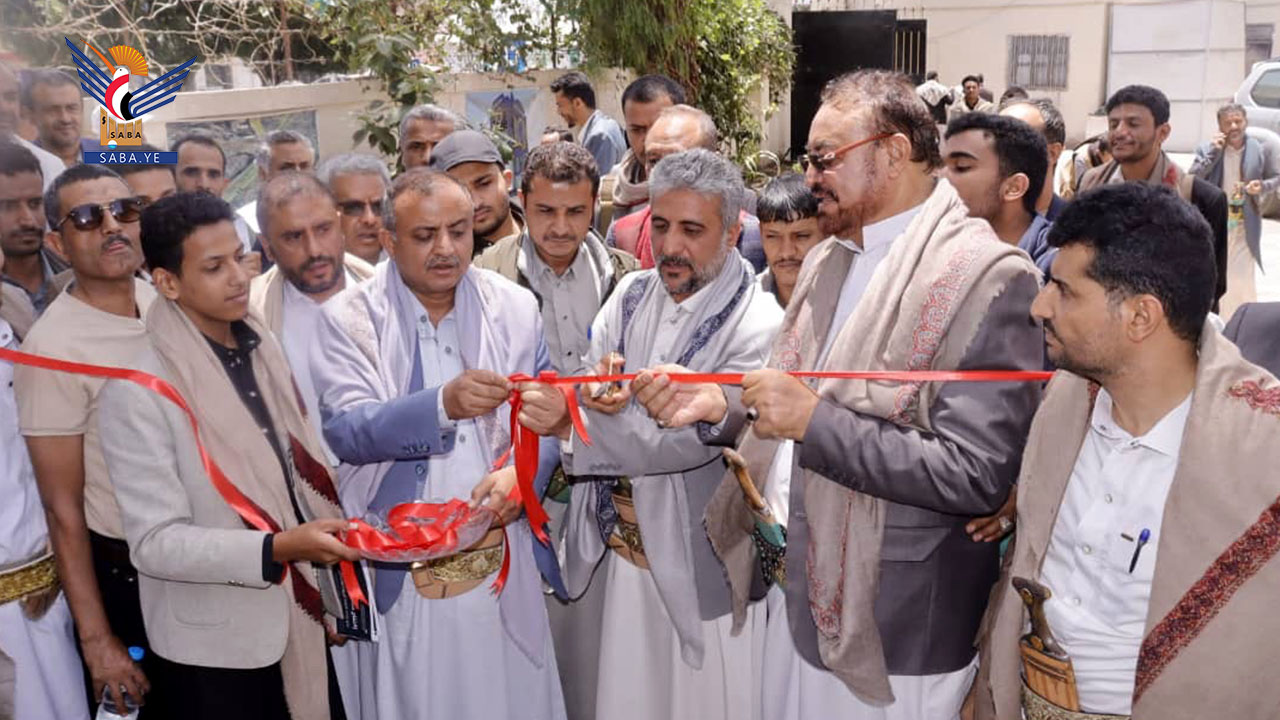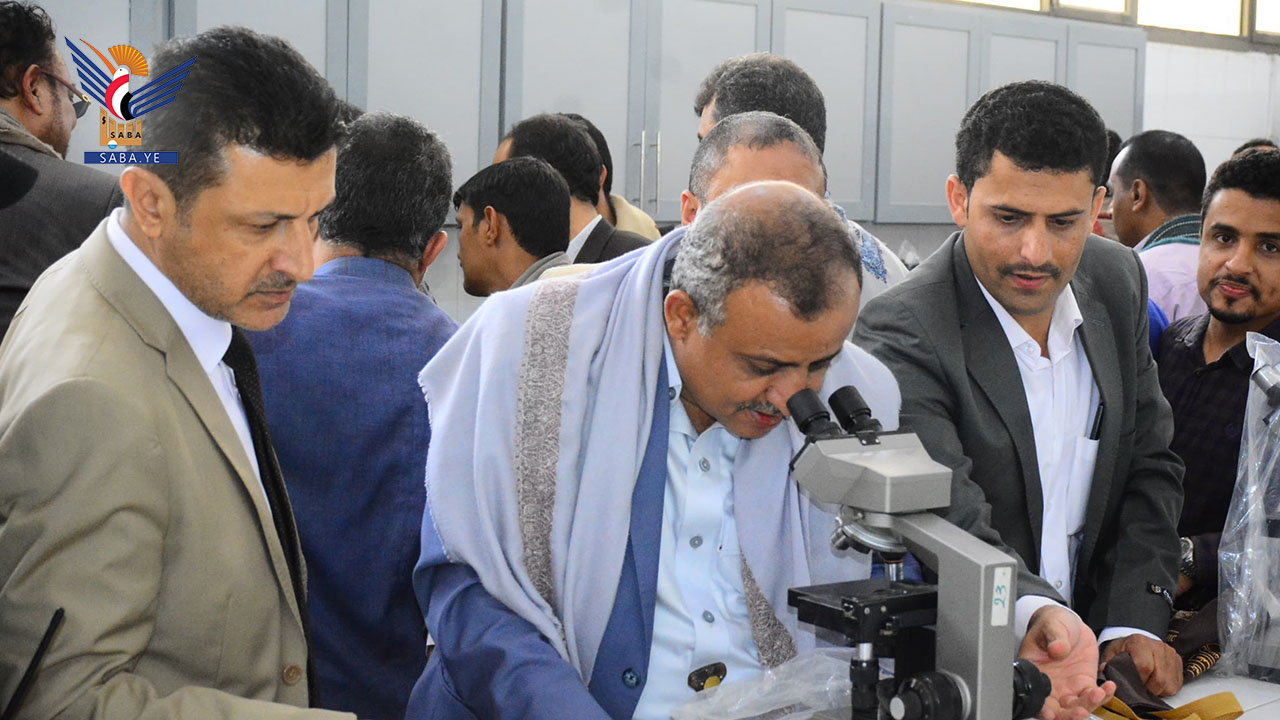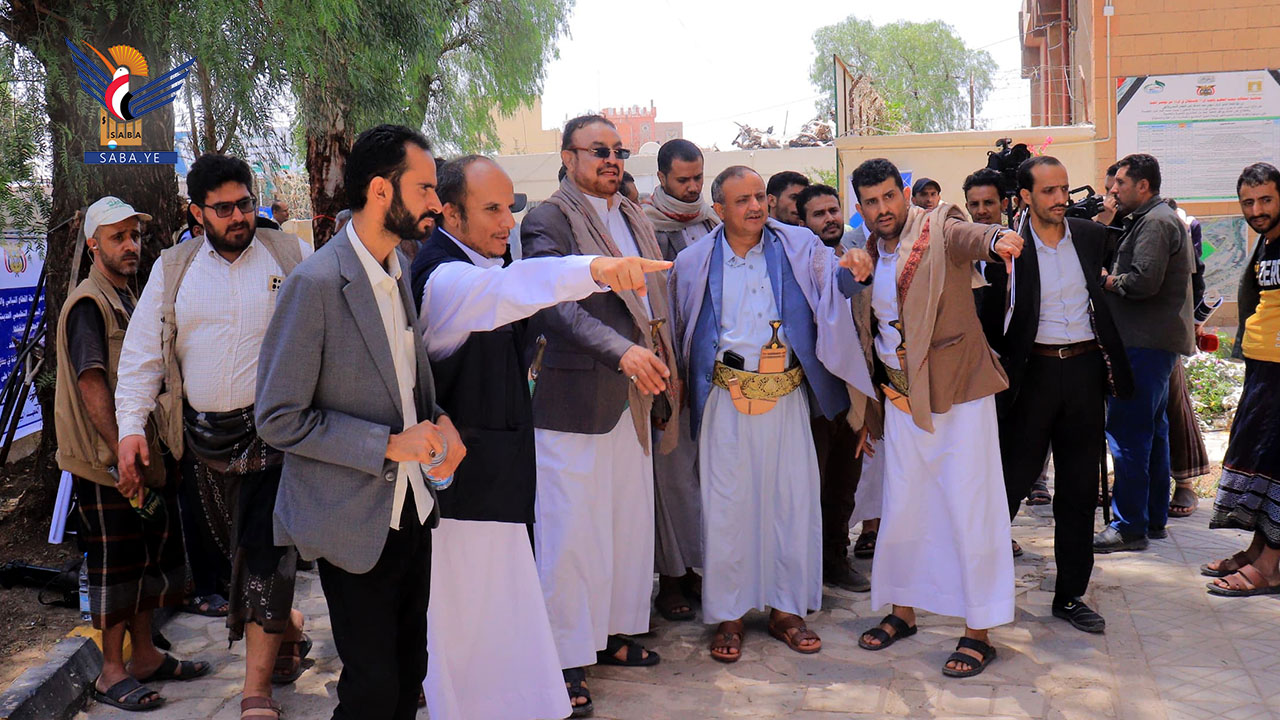
Sana'a - Saba:
Deputy Prime Minister for Local Administration, Rural Development, and Minister of Local Administration and Rural Development Mohammed Al-Madani, along with Minister of Agriculture, Fisheries, and Water Resources Dr. Radhwan Al-Rabai, and Capital Secretariat Governor Dr. Hamoud Abbad, inaugurated on Tuesday a number of agricultural and fisheries projects in the Capital Secretariat at a cost of 659 million and 779 thousand Yemeni riyals.
These projects, funded by the local authority in the Capital Secretariat through the Agricultural Projects and Initiatives Financing Unit, included:
- Establishing fish and marine product sales points in the Secretariat’s districts.
- Installing advertising boards to promote agricultural and fisheries products.
- Launching the unit’s digital platform to enhance e-service efficiency and facilitate beneficiaries' access to support and financing.
The projects also encompassed the second phase of support for plant and animal sector activities at the Agricultural and Veterinary Institute, including maintenance, furnishing, and operation of equipment at the modern veterinary teaching hospital. Additionally, they involved providing necessary tools , materials for medical devices and training veterinary staff on their use.
Other initiatives included expanding capacity and improving educational resources for the College of Veterinary Medicine and the College of Agriculture (Phase II), which involved supplying and installing furniture for four lecture halls in the veterinary college and the new agricultural college’s auditorium.
Among the inaugurated projects were:
- Rehabilitation, maintenance, and restoration of the Agricultural , Fisheries Projects and Initiatives Financing Unit’s building.
- Maintenance, rehabilitation, and furnishing of agricultural sector buildings.
- Rehabilitation of the mechanical maintenance workshop and servicing agricultural sector equipment.
- Procurement and supply of surveying equipment for the financing unit’s operations.
During the inauguration, Deputy Prime Minister Al-Madani emphasized the importance of these developmental projects in strengthening value chains. He noted that the government is currently implementing policies and mechanisms related to value chains and reducing import costs, with all current projects directly impacting society and contributing to self-sufficiency and food security.
He highlighted the opening of marketing-related projects, such as fish sales points, and institutional development projects, including equipping the veterinary hospital, which will serve professionals in veterinary and animal value chains.
Al-Madani mentioned new marketing initiatives, such as upcoming value chain festivals in various provinces, and multiple value chains being implemented nationwide by financing units and local authorities, covering fisheries, cotton, dates, and other sectors.
He stressed the importance of the Capital Secretariat’s role as the final link in the value chain, receiving raw materials produced in rural areas and marketing them through projects that promote fresh product sales while processing others to reduce import costs. This step enhances economic empowerment for families and activates the private sector to receive raw materials from rural regions.
Minister of Agriculture, Fisheries, and Water Resources Dr. Radhwan Al-Rabai affirmed that the launched projects focus on economic aspects, particularly marketing and export, to absorb local products and enhance their competitiveness. He stated that the next phase would see integration between financing units in the Capital Secretariat and provinces to implement qualitative initiatives addressing local agricultural value chains, reducing imports and advancing self-sufficiency.
Dr. Al-Rabai noted a serious commitment to achieving self-sufficiency by building a resilient economy that adapts to regional and international changes.
Capital Secretariat Governor Dr. Hamoud Abbad emphasized the significance of these projects in laying the foundation for agricultural, livestock, and marketing development, highlighting the Secretariat’s central role in successfully marketing local products through festivals, exhibitions, fish sales points, and permanent markets.
He underscored the importance of cooperative initiatives in achieving sustainable development and fostering partnerships between official and community sectors in value chains and economic empowerment.
Engineer Abdulmalik Al-Ansi, Director of the Agricultural and Fisheries Projects and Initiatives Financing Unit, stated that these projects mark the first phase of a strategic series to be announced soon, as part of a comprehensive plan to enhance community production and create a stimulating developmental environment.
He added that the new projects will launch an ambitious development plan prepared in recent months to empower agriculture, fisheries, vocational education, and digital services, improving local production efficiency, creating jobs, and enhancing citizen services.
Al-Ansi affirmed the unit’s commitment to expanding productive projects and targeting sectors most vital to people’s lives, aiming to build a strong economy based on planning, sustainability, and community participation.
Deputy Prime Minister for Local Administration, Rural Development, and Minister of Local Administration and Rural Development Mohammed Al-Madani, along with Minister of Agriculture, Fisheries, and Water Resources Dr. Radhwan Al-Rabai, and Capital Secretariat Governor Dr. Hamoud Abbad, inaugurated on Tuesday a number of agricultural and fisheries projects in the Capital Secretariat at a cost of 659 million and 779 thousand Yemeni riyals.
These projects, funded by the local authority in the Capital Secretariat through the Agricultural Projects and Initiatives Financing Unit, included:
- Establishing fish and marine product sales points in the Secretariat’s districts.
- Installing advertising boards to promote agricultural and fisheries products.
- Launching the unit’s digital platform to enhance e-service efficiency and facilitate beneficiaries' access to support and financing.
The projects also encompassed the second phase of support for plant and animal sector activities at the Agricultural and Veterinary Institute, including maintenance, furnishing, and operation of equipment at the modern veterinary teaching hospital. Additionally, they involved providing necessary tools , materials for medical devices and training veterinary staff on their use.
Other initiatives included expanding capacity and improving educational resources for the College of Veterinary Medicine and the College of Agriculture (Phase II), which involved supplying and installing furniture for four lecture halls in the veterinary college and the new agricultural college’s auditorium.
Among the inaugurated projects were:
- Rehabilitation, maintenance, and restoration of the Agricultural , Fisheries Projects and Initiatives Financing Unit’s building.
- Maintenance, rehabilitation, and furnishing of agricultural sector buildings.
- Rehabilitation of the mechanical maintenance workshop and servicing agricultural sector equipment.
- Procurement and supply of surveying equipment for the financing unit’s operations.
During the inauguration, Deputy Prime Minister Al-Madani emphasized the importance of these developmental projects in strengthening value chains. He noted that the government is currently implementing policies and mechanisms related to value chains and reducing import costs, with all current projects directly impacting society and contributing to self-sufficiency and food security.
He highlighted the opening of marketing-related projects, such as fish sales points, and institutional development projects, including equipping the veterinary hospital, which will serve professionals in veterinary and animal value chains.
Al-Madani mentioned new marketing initiatives, such as upcoming value chain festivals in various provinces, and multiple value chains being implemented nationwide by financing units and local authorities, covering fisheries, cotton, dates, and other sectors.
He stressed the importance of the Capital Secretariat’s role as the final link in the value chain, receiving raw materials produced in rural areas and marketing them through projects that promote fresh product sales while processing others to reduce import costs. This step enhances economic empowerment for families and activates the private sector to receive raw materials from rural regions.
Minister of Agriculture, Fisheries, and Water Resources Dr. Radhwan Al-Rabai affirmed that the launched projects focus on economic aspects, particularly marketing and export, to absorb local products and enhance their competitiveness. He stated that the next phase would see integration between financing units in the Capital Secretariat and provinces to implement qualitative initiatives addressing local agricultural value chains, reducing imports and advancing self-sufficiency.
Dr. Al-Rabai noted a serious commitment to achieving self-sufficiency by building a resilient economy that adapts to regional and international changes.
Capital Secretariat Governor Dr. Hamoud Abbad emphasized the significance of these projects in laying the foundation for agricultural, livestock, and marketing development, highlighting the Secretariat’s central role in successfully marketing local products through festivals, exhibitions, fish sales points, and permanent markets.
He underscored the importance of cooperative initiatives in achieving sustainable development and fostering partnerships between official and community sectors in value chains and economic empowerment.
Engineer Abdulmalik Al-Ansi, Director of the Agricultural and Fisheries Projects and Initiatives Financing Unit, stated that these projects mark the first phase of a strategic series to be announced soon, as part of a comprehensive plan to enhance community production and create a stimulating developmental environment.
He added that the new projects will launch an ambitious development plan prepared in recent months to empower agriculture, fisheries, vocational education, and digital services, improving local production efficiency, creating jobs, and enhancing citizen services.
Al-Ansi affirmed the unit’s commitment to expanding productive projects and targeting sectors most vital to people’s lives, aiming to build a strong economy based on planning, sustainability, and community participation.


